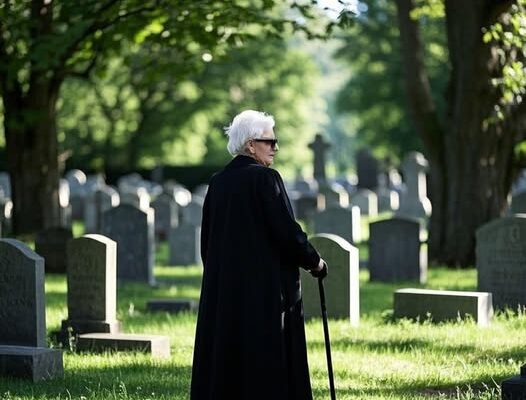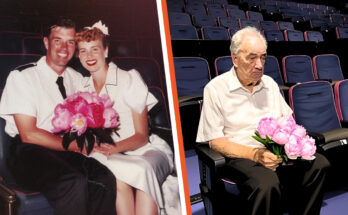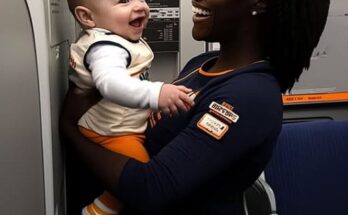I said “Goodbye, Dad” at his grave and started making my way out of the cemetery.
On my way, I noticed an elderly woman standing near a freshly dug grave. She looked lost, and her dark glasses and cane made it clear that she was blind.
“Excuse me,” I said gently. “Do you need any help?”
“If it’s not too much trouble, I’d really appreciate if you could walk me home,” she replied. Of course, I couldn’t say no.
As we walked, I learned her name was Kira. She was 67 and had just buried her husband a few days ago. Her sons had dropped her off at the cemetery, saying they’d be back in 30 minutes. She waited there for over two hours, and they never returned. Honestly, I was furious hearing how they’d left their own mother like that.
I took Kira home, helped her inside, and even stayed for a cup of tea before leaving with a promise that she could call me anytime for help.
But the next morning, my day started with a shock. Loud banging on my door woke me up. Groggy, I opened it to find two men, around 25 and 35, standing there.
“THAT’S HER! SHE WAS WITH OUR MOTHER YESTERDAY! SHE WAS IN OUR HOUSE!” one of them yelled.
A police officer stepped forward calmly and asked, “Good morning, ma’am. Did you, by any chance, spend time with a blind woman named Kira yesterday?”
I rubbed my eyes, my heart pounding. The men behind the officer stared at me like I was some kind of criminal. For a moment, I panicked, wondering what on earth could have happened. But I forced myself to stay calm and tell the truth.
“Yes,” I said, swallowing hard. “I met her at the cemetery, and she asked me to walk her home. Is she okay?”
The older of the two men—who I assumed were Kira’s sons—crossed his arms over his chest and snapped, “We came home late and found that my mother had invited a complete stranger in for tea. You could’ve robbed her blind—no pun intended. We want answers.”
I felt my cheeks heat up from the accusation. “Listen,” I replied, “I only helped your mother because she was stranded. She told me she’d been waiting for two hours, and… well, I guess that was your doing. I stayed for tea because she asked me to. That’s all.”
The younger son glared at me. “Something of our father’s is missing,” he spat. “A watch. A family heirloom. And you were the last person seen in the house.”
My stomach dropped. I had never even heard Kira mention a watch. I certainly didn’t take anything, let alone a precious heirloom. The police officer held up a hand to calm the situation. He turned to me and said, “We’d like to ask you a few questions down at the station. This could just be a misunderstanding.”
I had no problem with that. I was innocent. So, still in my pajamas, I put on a jacket and followed them to the local police station. My heart pounded the entire car ride. I couldn’t help thinking about my own dad’s funeral the day before, how raw my emotions were. The last thing I wanted was to be tangled up in some crime I didn’t commit.
At the station, I gave my statement. I explained every detail: from spotting Kira at the cemetery to drinking a cup of tea and heading home. The officer took notes, nodding, occasionally asking if I saw anything unusual in Kira’s house. I told him no. It was a modest home, well kept, with family photos and the usual furniture. Nothing that looked suspicious to me.
After about an hour, the officer let me go. He said, “We’ll be in touch if we need more information. I recommend you don’t leave town for the next few days.” The younger son shot me a fierce glare, while the older one just shook his head and walked away. I felt a pang of anger rising in me—what kind of children leave their blind mother alone at a cemetery, then blame a total stranger for their father’s missing watch?
When I got home, I realized I was still shaking. I tried to distract myself by cleaning the kitchen, but my mind kept drifting back to Kira’s sorrowful face. How lonely she’d seemed. How her hands trembled when she poured tea. I remembered she mentioned that she’d spent most of her life caring for her husband, who had fallen ill years before passing away. And now her sons seemed more worried about an heirloom than their mother’s well-being.
By mid-afternoon, I received a call from an unknown number. My heart skipped a beat. I picked up, expecting to hear the police again, but it was Kira’s voice.
“Hello, dear,” she said softly. “I hope you don’t mind me calling. I asked a neighbor to help me get your number from my phone. I’m so sorry about all of this trouble.”
“Kira, are you all right?” I asked, relieved to hear from her. “What’s going on? I would never steal from you. You know that, right?”
“I do,” she replied immediately. “I might be blind, but I’m not blind to people’s hearts. I can sense you’re a good person. This is all a misunderstanding. My husband’s watch…” She paused, taking a shaky breath. “My husband’s watch was gone long before you came. He gave it to me the night before he passed away, and I hid it in a place my sons don’t know about.”
My breath caught. “Why would you hide it from them?”
Kira sighed. “Because they’ve never cared for me the way they claim to. They’re good boys, in their own way, but they’ve changed since their father fell ill. They only seem concerned about inheritance, about who gets what. I hid that watch because it was special to me, and I didn’t want it sold or pawned to pay off their debts. I only realized they were trying to find it after the funeral. They must have noticed it was missing from my husband’s belongings.”
I felt a surge of relief. “Then you need to talk to the police, Kira. Clear my name.”
She promised she would do exactly that. The next morning, Kira and I walked into the station together. She looked frail, but she held her head high. She told the officer exactly what she’d told me—that the watch was never in the house, that it was safely in her possession the whole time. She even handed it over for verification, explaining it was a family heirloom she intended to keep.
Her sons had no choice but to apologize—though it was clear from their tight jaws and clenched fists that they did it reluctantly. The officer let them off with a warning: if they wasted police time again with a false theft accusation, there would be consequences.
As for me, I felt a mixture of relief and sadness. Relief because I was no longer under suspicion, and sadness because of how poorly Kira’s sons treated her. She invited me to her home once more, this time as her friend. I accepted. I couldn’t shake the feeling that she deserved better than to be alone with such ungrateful children.
When I arrived at Kira’s place that afternoon, she was waiting at the door with her cane, a sweet smile on her face. We sat in her cozy living room, talking about everything from her late husband’s sense of humor to her fond memories of raising her boys when they were little. I realized, as she spoke, that people are rarely black and white. Maybe her sons had their own struggles that made them act out. Maybe they had regrets and fears they didn’t know how to handle. I didn’t condone their behavior, but it reminded me that families can be complicated.
After our talk, Kira pressed a small photo into my hand. It was a picture of her standing arm in arm with her husband many years ago. She laughed softly and said, “I can’t see it anymore, but I remember every detail of that day. I want you to have this as a reminder of our friendship.” Tears pricked my eyes as I thanked her. I promised I would treasure it.
Over the following weeks, Kira and I grew closer. I’d help her with groceries, and we’d chat about simple things like the weather or what show was on TV. Sometimes, we’d visit the cemetery together, each of us paying respects to the people we’d lost. And in this shared grief, we found comfort—like two unexpected friends brought together by fate.
Gradually, Kira’s sons also began to change. One afternoon, the younger son actually came by while I was helping Kira sort through some old clothes. He apologized again, this time with genuine remorse in his voice. He admitted that he and his brother had struggled with financial problems, and they unfairly assumed I was out to get their mother. Seeing how much better Kira seemed—laughing more, even humming in the kitchen—made them realize she wasn’t just their burden, but a human being with her own life and joys.
It wasn’t a perfect happy ending. The older son was still a bit distant, but at least he stopped glaring at me. The younger one began offering to drive Kira to her appointments, and I noticed she was smiling more often. Maybe it was just baby steps, but it was progress.
In the end, what I learned from this whole situation is that kindness can sometimes lead you into complications, but it’s still worth it. If I hadn’t offered to walk Kira home that day, I would’ve missed out on forming a special bond with someone who needed a friend. Yes, there was drama, police involvement, and accusations—but it was all resolved with honesty and compassion. And Kira got a chance to keep her beloved heirloom safe, while gradually reconciling with her sons.
Life can throw us into some unexpected moments. Sometimes they’re painful, and sometimes they remind us that, deep down, we all just want to be cared for and understood. Kira and I might have started as strangers in a cemetery, but we ended up being each other’s reason to keep smiling.
I hope anyone reading this story realizes that small acts of kindness can grow into something bigger than we ever expect. Even when it gets messy, there’s almost always a chance to find clarity, forgive, and move forward. So, if you’ve got an opportunity to help someone—even if it’s just walking them home—go for it. You never know who might need a friend, or how that simple act could change both your lives.
Thank you for reading this story. If you found it moving or learned something from it, please share it with your friends and give it a like. Let’s spread kindness whenever we can—because the world could always use more of it.



